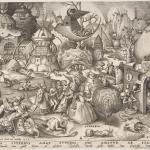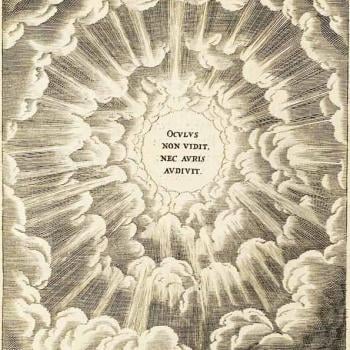 Dionysius, having explored many important names and titles traditionally used to describe God, finished off his exposition, denying them as being properly predicated to him by saying nor [can he be properly designated by] any other thing of those known to us, or to any other existing being. Goodness, divinity, truth, oneness, and beauty all help point us towards the greatness of God, but even they, in themselves, represent something of created being, and so have been shown by Dionysius to fail to meet the transcendent cause of everything, of every being, which conventionally is named as God.
Dionysius, having explored many important names and titles traditionally used to describe God, finished off his exposition, denying them as being properly predicated to him by saying nor [can he be properly designated by] any other thing of those known to us, or to any other existing being. Goodness, divinity, truth, oneness, and beauty all help point us towards the greatness of God, but even they, in themselves, represent something of created being, and so have been shown by Dionysius to fail to meet the transcendent cause of everything, of every being, which conventionally is named as God.
Kataphatic theology engages what has been revealed about God through the use of names and symbols, showing how they point to the absolute truth. Kataphatic theology relies upon the analogy of being in order to present the truth of God in a conventional form. While analogy relies upon both the similarity and difference of the two different analogues, kataphatic theology relies upon the similarity while apophatic theology reaffirms the difference which underlies the apparent similarity. All things, as they exist, can be used in positive theology to serve as a symbolic reference for our understanding of God. Kataphatic theology explores these representations of God, examining them in detail, deducing, likewise, truths about God which seem to come from such representations. The value of such theological exploration and reasoning is without question; it helps us become attuned to God. The problem, of course, is that the radical difference between God and all his creation, a difference which can be said to be infinite in quality, reduces such analogies to mere conventions which cannot and must not be held on to as being more than conventions used to represent God.
The problem, as Henry of Ghent realized, is that we tend to truncate our analogies, so that instead of being used as likenesses which allow us to compare the two analogues, we end up seeing the qualities of various created beings being truncated down so that we end up equivocating the two analogues so that the analogy no longer is an analogy but suggests something univocal about the two analogues. [1]This is especially troublesome when talking about God. We might realize there is some form of difference between the analogue which we use to represent God, but where we find similarity, instead of keeping the difference in mind, we truncate the two analogues together, and we do this by lowing what we think about God through the analogue in question. We end up, therefore, equivocating God for the analogy which we use. Dionysius’s means of preventing this problem was to suggest that whatever we use to symbolize God, God is such in a super-eminent fashion. This allow the symbol to remain useful for theological reflection while making sure God is not confused with the symbol itself.
Whatever we predicate to God through analogy, can only serve as a conventional pointer to the truth. Likewise, whatever we try to use does not represent God as he is in himself but God in the way which we come to know him through his works. When we want to have the absolute truth of God, as he is in himself, the only way we can have it is through God himself. Theological representations, no matter how sophisticated they are, no matter how much revelation is employed to establish them, all borrow from the realm of being. Because of the radical difference between God and created being, we must ultimately deny anything which we can say about God because whatever we say comes from created being as a reference point and so falls short of the simple uncreated transcendence of God.
Likewise, we are not the only ones who will fail to comprehend God by what we know; all created beings, no matter how great their intellect, suffer from this same basic failure. Nothing in the realm of being will be able to know God as he is in himself. All being is limited, while God is not. As Ficino explained, even those beings such as angels, while their knowledge and understanding of God will be superior to ours, because their intellectual abilities are greater than ours, nonetheless they, too, find themselves far from comprehending God: “And so to all the notions that the highest of angels have naturally conceived, and more sublimely so, they [too] are inferior to God.”[2] Because angels were seen to have the greatest form of intellect in creation, when Dionysius denied “any created being” as being able to know who and what God is, they were consistently invoked by commentators as being the most important representation of this point.[3] If angels cannot know God in this fashion, and they are superior in their intellect to us, than anything less than angels will likewise be understood as incapable of comprehending God. This is why revelation, when it comes to us through the mediation of some secondary source and not directly from an experience from God, while it is beneficial and can be an authentic source for positive theological reflection for God, must be understood as a relative truth which, remains far from the ultimate truth. When talking about revelation, we must therefore, realize there is a hierarchy of truth and potential, and we should take under consideration who and what is giving us the revelation. If it is an angel, it can give us some sublime truth which will help us with our theological reflection, but it must not be taken as representing the ultimate truth of God. In himself, God transcends all that can be said about him, even in the form of revelation. There will forever remain a sense of mystery surrounding him because of his incomprehensible nature. We must never remain attached to our own understanding of God. We must be willing to learn from others, as well as from God himself, complementary revelations of truth. So long as we become attached to what we think we know, we close ourselves off from that transcendence. Every positive assertion must be denied lest we end up creating an idol for ourselves concerning God and use that idol to hinder our engagement with God himself.
[IMG=Fantasy Light Mood Sky Beautiful [CC0 Creative Commons] via pixabay]
[1] See Henry of Ghent, Summa of Ordinary Questions: Articles Thirty-One & Thirty-Two: On God’s Eternity & The Divine Attributes in General. Trans. Roland J Teske, SJ (Milwaukee, WI: Marquette University Press,2012), 61.
[2] Marsilio Ficino, Mystical Theology in Marsilio Ficino: On Dionysius the Areopagite. Volume I: Mystical Theology and The Divine Names, Part I. trans. And ed. Michael J. B. Allen (Cambridge: Harvard University Press, 2015), 81
[3] See also St. Albert the Great, “Commentary on Dionysius’ Mystical Theology” in Albert & Thomas, Selected Writings. Trans. Simon Tugwell, OP (New York: Paulist Press, 1988), 197; and Robert Grosseteste, “De Mystica Theologia” in Mystical Theology: The Glosses of Thomas Gallus and the Commentary of Robert Grosseteste on De Mystica Theologia. Trans. and ed. By James McEvoy (Parish: Peeters, 2003), 119.
Stay in touch! Like A Little Bit of Nothing on Facebook













